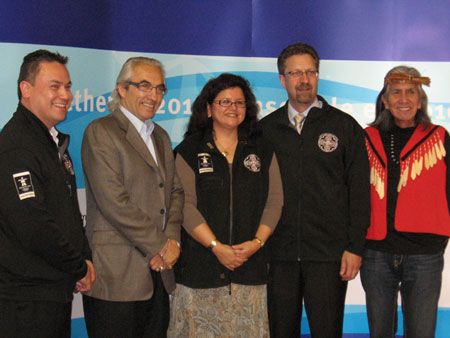Sell-Out Chiefs to be Pampered by Olympic Industry
First Nation leaders to get the presidential treatment
By Robert Matas and Rod Mickleburgh, The Globe and Mail, Monday, November 30, 2009
http://www.ctvolympics.ca/about-vancouver/news/newsid=21095.html#first+n... VANCOUVER -- When it comes to U.S. President Barack Obama's possible presence at the 2010 Winter Olympics here, mum's the word. Officially, lips are sealed. But should Mr. Obama decide to brave the likely rain and snow for a visit, the world's most powerful leader will rank no higher on the Olympic protocol chart than a 39-year-old chief of the small Tsleil-Waututh native band on the north shore of Burrard Inlet. For the first time, four aboriginal leaders, including Justin George, chief of the 400-member Tseil-Waututh, will be accorded status equivalent to head of state at an Olympic Games. It may be a first anywhere for indigenous representatives for such a high-profile international event. "I don't think aboriginal leaders have ever been recognized in this way," said one 2010 protocol official, who asked not to be identified. The exalted designation granted chiefs of the Four Host First Nations, on whose traditional territory the 2010 Games will take place, includes access to all events, prime seating among other dignitaries, access to the private Olympic lounges, transportation, and their own assistant to ensure that all protocol goes smoothly. "They will have the same status as other leaders from around the world, and it's about time," Tewanee Joseph, executive director of the Four Host First Nations, said yesterday. "We want to show that our chiefs are head of their own communities, with their own governance structure. It's very important for them to have discussions with other leaders at the same level, rather than just being talked down to." Mr. George, grandson of the legendary actor and writer Chief Dan George and only recently elected chief, said he's still a bit awed by what lies ahead at the Games. "All I know is that there's a ticket available to everything, for myself and a guest, and that includes VIP events. This is definitely a precedent for the Olympic Games. It sets a new bar for indigenous people everywhere." The same status, which the International Olympic Committee calls "honoured guests," is also conferred on Chief Leonard Andrew of the Lil'Wat Nation near Whistler, site of Olympic alpine and sliding events, and Ernie Campbell, veteran chief of the 1,200-member Musqueam band in southwest Vancouver. "If you are President of the United States, you are going to get free access to anything," Mr. Campbell said. "We are treated as heads of state with the same privileges, like those of any other country." The fourth chief in line for special treatment at the Games is currently Bill Williams of the Squamish Nation. However, band elections are scheduled to take place this weekend on the reserve, which stretches from Burrard Inlet to the community of Squamish near Whistler. The status arrangement is part of a long-standing multiparty agreement signed by civic, provincial, federal, aboriginal and local Olympic officials ahead of Vancouver's successful bid to stage the 2010 Winter Games. In return for their support, the Four Host First Nations became equal Olympic partners, an unprecedented standing at the Games for aboriginal representatives. "They are part of our success in so many areas, so it's more than appropriate to make sure that they are part of our domestic dignitary group," said Taleeb Noormohamed, VANOC vice-president for partnerships. "They have a huge role in making sure we can create the right conversations and the right relationships with people from around the world." Mr. Joseph of the Four Host First Nations said it's vital for aboriginal people to move beyond "ceremonial stuff" at events like the Olympics and point to tangible accomplishments, such as their full-fledged partnership at the Games. "This recognition is starting to resonate around the world," he said, recalling a visit earlier this year to New Zealand and its substantial Maori population. "Maoris and non-Maoris alike told me: ‘We're proud of what we've done in this country, but what you guys are doing far exceeds that.' " Squamish band councillor Lois Joseph said the Games are taking place in their traditional territory, which they have never ceded by treaty. "We are proud that they acknowledge that, so this is a very big honour for us. It's never happened before. We have our own traditions and we want to show that to the world."
